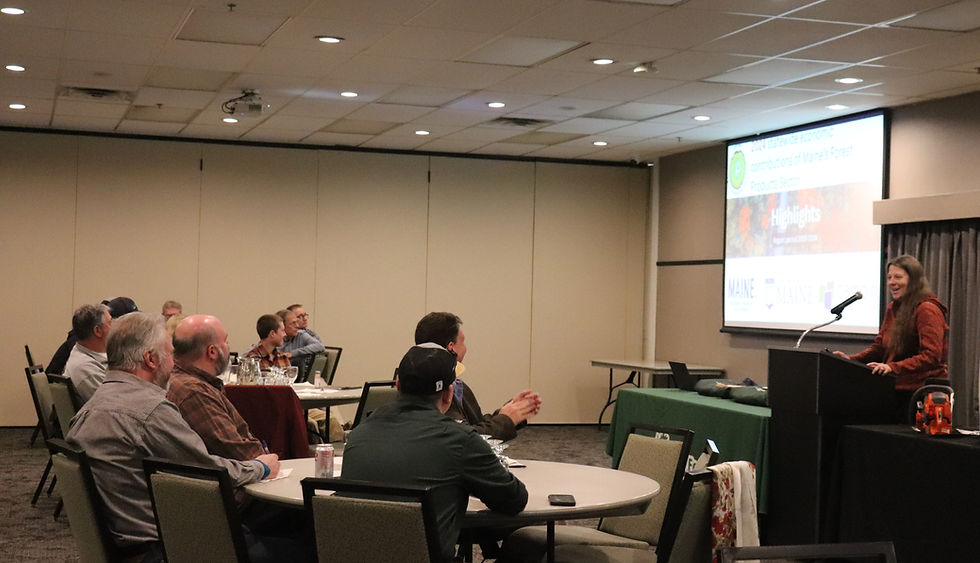Workers’ Compensation Rates Hit Record Low for Certified Logging Professionals in Maine
- Hope Light

- May 8, 2024
- 4 min read
Written by Hope Light
Despite the industry’s notorious reputation as the most dangerous occupation in the United States, a subset of Maine’s Logging Professionals are experiencing significantly lower injury rates and have been rewarded with all-time low workers’ compensation rates.
Founded in 1991, Certified Logging Professionals is a combined effort of loggers, landowners, environmental specialists, and safety consultants to establish a standard for professionalism in the Maine woods. Offering professional development and certification for Maine loggers, the program’s immediate goal was to combat the high rate of logging accidents and the resulting Worker’s Compensation costs for logging contractors.
Today, the program takes pride in the fact that the accident rate for loggers is significantly lower than when the program began. As a result, mechanical certified loggers have earned a Workers’ Compensation rate 48% lower than non-certified mechanical loggers, and the conventional CLP logging rate is 83% lower than in 1988.


Initiated by Maine TREE, an agreement with the Maine Bureau of Insurance was devised outlining stipulations that, if met, would lead the bureau to set a discounted rate for Certified Logging Professionals. The stipulations were as follows: the logger education program would include subject areas and recommendations from loggers and various industry stakeholders for certification and recertification. Onsite performance-based workplace evaluations would be completed with recommendations for continuous improvement. A database of active CLPs would be documented for workers’ compensation companies. After three years, the CLP rate would stand on its own. CLP was granted its separate designation by the Maine Insurance Bureau in 2006. As a testament to the program’s effectiveness, the injury rate has continuously improved; subsequently, rates have continued to be lower. “It is great to see the industry continues to experience some of the lowest injury rates and associated insurance rates nationwide. These low rates are a great benefit for all, and we must remain focused, with continuous improvement and professional development to maintain a safe working culture in Maine’s forest.” Said Mike St. Peter, Associate Director, Certified Logging Professional Program
“It’s important to emphasize that not only are Maine-based forestry businesses saving money through lower workers’ compensation rates for their CLP-certified employees, but Certified Logging Professionals throughout Maine are experiencing fewer injuries and, in turn, fewer disruptions in their lives. It’s important to celebrate the improved working conditions and safety of our forest-based workforce in addition to the economic benefits of the CLP program.” added Hope Light, Communications Coordinator for Maine TREE
Equally important, our participants helped CLP meet its overall objective of cultivating skill, knowledge, and pride in the Maine woods. To be certified, candidates must attend a CLP-sponsored four-day (32-hour total) workshop and pass a worksite evaluation. The workshop includes three days of classroom instruction in first aid/CPR, forest management and silviculture, safe and efficient wood harvesting, and business. The final day is devoted to on-site instruction and hands-on tree felling using the nationally recognized Game of Logging system or mechanical harvesting safety. Times devoted to each topic may vary depending on the class’s needs. To be certified, CLP candidates must pass an inspection at their work site. Evaluators interview each participant, observe their work practices, and then determine whether the logger adheres to the principles presented in class. The evaluators recommend certification or non-certification to the CLP Board of Directors, making the final decision.
CLP candidates are offered certification in five categories: Conventional for loggers who operate skidders and chainsaws, mechanical for loggers who operate harvesting equipment, contractor/supervisor for employers and people who supervise loggers, associate for individuals who are interested in logging but who do not actively log or supervise loggers, this group includes foresters, truckers, and others connected with the logging industry, and apprentice for graduates of high school and post-secondary wood harvesting programs, those who qualify for the apprentice program can earn certification once they have six months of paid experience and pass the field interview.
For all categories, a one-day re-certification course and field inspection are required within a year of the initial instruction and certification and every other year thereafter. Because of their added responsibility for the performance and safety of others, supervisor/contractor CLPs are encouraged to complete an additional day of job-site supervisor training within their first year. All CLPs are subject to periodic inspections and are kept abreast of program updates through newsletters, mailings, and an annual banquet.
The mission of the CLP program is to offer top-quality training and education to individuals employed in the Maine logging industry. The program is dedicated to recognizing the skill and professionalism of those who meet and surpass the CLP standard. The successful candidate of the CLP program will be equipped to work securely, efficiently, and in a manner that safeguards, enhances, and sustains the forest. Our program is constantly evolving to reflect changes in the forest products industry and to provide a way for continuous professional development.”For over three decades, the CLP program has strived to improve safety at harvest operations in Maine’s forests. The recent record-breaking low in workers’ compensation rate for program participants is a testament to the successes achieved through CLP’s continuous effort and innovation in the sector. This outstanding accomplishment reflects the professionalism and excellence exhibited by Maine loggers,” said Logan Johnson, Executive Director of Maine TREE.
If you would like to know more about the Certified Logging Professional program, please visit clploggers.com.
.jpg)



Comments